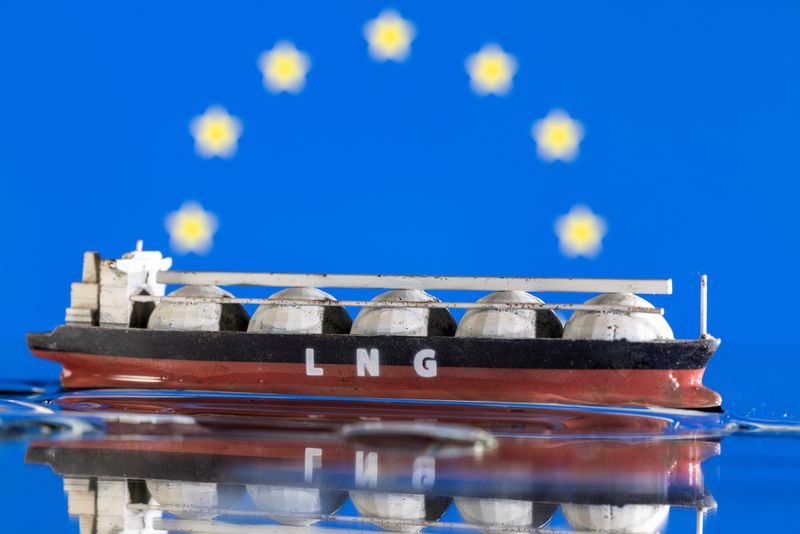Investing.com’s stocks of the week
By Kate Abnett, Marwa Rashad and Gabriela Baczynska
BRUSSELS/LONDON (Reuters) - Political pressure is building within the European Union to tackle the daunting challenge of closing a loophole in its efforts to stop using Russian fossil fuels: liquefied natural gas (LNG).
In the year since Russia's February 2022 invasion of Ukraine, the EU has placed sanctions on seaborne oil and coal imports from Russia.
It has drastically cut reliance on Russian pipeline gas, despite not imposing sanctions on the fuel. But at the same time, EU countries have increased their overall purchases of Russian LNG, undermining the bloc's pledge to end its use of Russian fossil fuels by 2027.
As a consequence, the EU has sent billions of dollars to Russian gas firms Gazprom (MCX:GAZP) and Novatek that can be used to finance the war in Ukraine, as the energy companies, via corporate taxes, are among the largest contributors to Russia's budget.
Analysts at CapraView, a global gas forecasting firm, estimate almost half of the LNG Russia exported in the first ten months after its invasion of Ukraine flowed to Europe, representing approximately $14 billion in revenue.
(Graphic: Russian LNG exports by region Russian LNG exports by region - https://www.reuters.com/graphics/UKRAINE-CRISIS/EU-LNG%20UKRAINE-CRISIS/zgpobjmnqvd/Russian%20LNG%20exports%20by%20region.jpg)
EU analysis found Russian LNG imports increased to 22 billion cubic metres (bcm) last year, up from 16 bcm in 2021. Those volumes are far smaller than the 155 bcm of pipeline gas the EU used to receive each year from Moscow, although some countries have seen a significant uptick since the war.
Belgium and Spain nearly doubled their imports of Russian LNG in the 12 months since Russia invaded Ukraine, analysis by Kpler showed.
(Graphic: LNG exports from Yamal LNG exports from Yamal - https://www.reuters.com/graphics/UKRAINE-CRISIS/EU-LNG%20UKRAINE-CRISIS/xmpjkjobevr/LNG%20exports%20from%20Yamal.jpg)
The appetite to address the issue is mounting within the 27-member European Union, but there is no agreement on how as the risks of inflating energy prices and inadvertently boosting Russian energy revenues further are considerable.
EU Energy Commissioner Kadri Simson last month urged member states and EU companies to stop buying Russian LNG, calling it a "reputational risk" to have LNG imports rising while the bloc touts its efforts to cut revenue to Russia.
Also last month, Spanish Energy Minister Teresa Ribera asked Spanish buyers not to sign new Russian LNG contracts. But she said that unless there were sanctions, EU companies that stopped buying Russian LNG could be forced to pay penalties for breaking their existing contracts.
"I think it should be part of the discussion in a sanctions package, because otherwise the situation is quite absurd," Ribera told Reuters.
"It's true that in total amounts, it's not so much. But I think it is not easy to explain why we still accept these LNG imports," she said.
Given the political hurdle of approving sanctions, which require unanimity, some in the EU are turning to other options.
Last week, member states collectively proposed that the bloc create a legal option to let countries stop Russian firms booking the infrastructure capacity needed to ship LNG to Europe.
The proposal, which is part of a law containing broader rules on EU gas markets, must be negotiated with the European Parliament. The Parliament wants to go further, and has proposed an effective ban all EU imports of Russian gas.
"Unprecedented times require unprecedented responses," said parliament's lead negotiator on the law, former Polish prime minister Jerzy Buzek. He said the proposal aligned with the EU's strategy to end its reliance on all Russian fossil fuels.
PRACTICAL AND LEGAL QUESTIONS
Some EU officials, however, said the Parliament's proposal was extremely unlikely to win political support from member states, in part because of legal issues.
Klaus-Dieter Borchardt, a Senior Energy Advisor at law firm Baker McKenzie, said World Trade Organisation law only allows countries to ban a specific product from their market in certain limited circumstances.
"I personally would have my doubts whether such a rule would be compatible with these non-discrimination rules under the WTO," he said of the Parliament's proposal. Borchardt was previously a senior official in the European Commission's energy department.
Dutch Energy Minister Rob Jetten told Reuters there was the practical difficulty that some countries cannot diversify their supplies quickly enough to cope with an immediate halt.
"For some EU member states, this would be a bit too much," he said, referring to the prospect of sanctions on Russian LNG.
The Netherlands has eliminated its Russian pipeline gas imports since the war and reduced, but not eliminated, Russian LNG imports.
TO BAN OR NOT TO BAN
Halting Russian LNG imports would be double-edged, analysts say.
It could drive up European gas prices without necessarily reducing Russian export revenues, since LNG can easily be redirected to markets in Asia that have not imposed sanctions on Russia, CapraView Chief Analyst Tamir Druz said.
"Unlike pipeline gas exports, which are essentially stranded in Russia, it will be much more difficult to reduce Russian revenues or global gas market dependence on Russian LNG," he said.
Enforcing a ban could also be challenging, given the difficulty of ruling out that LNG cargoes from other countries do not contain Russian volumes, especially via ship-to-ship transfer.
Some EU diplomats expressed concern suppliers could be deterred from sending cargoes to Europe if they were required, for instance, to provide documents proving their LNG is not Russian, when buyers in other markets do not require such proof.
With the LNG market currently tight, some analysts said Europe may struggle to replace Russian LNG with alternatives, threatening gas shortages if countries cannot fill the gap.
"The 101 of sanctions is not to hurt yourself more than the party you want to sanction," said Anne-Sophie Corbeau, a researcher at Columbia University's Center on Global Energy Policy.
